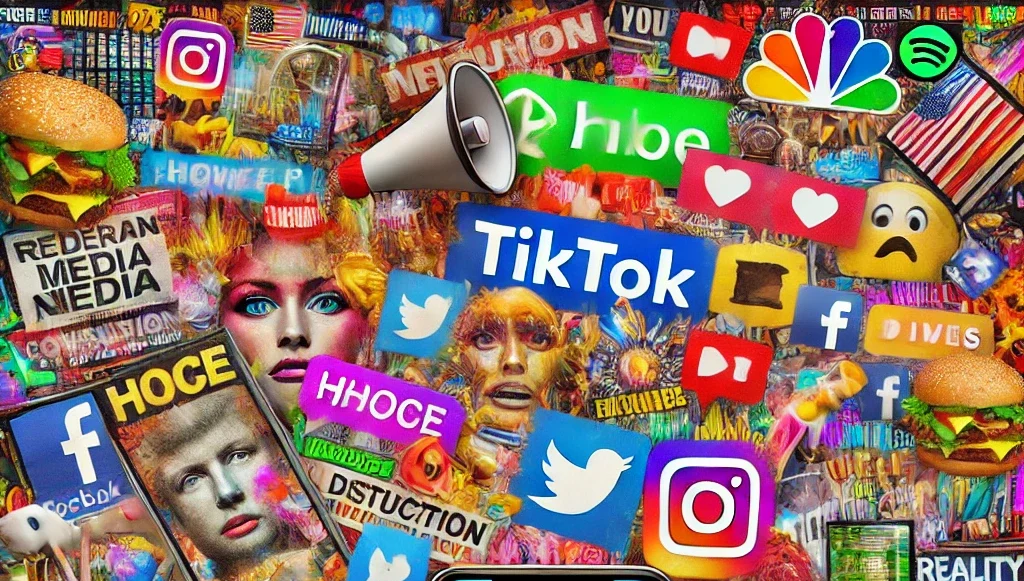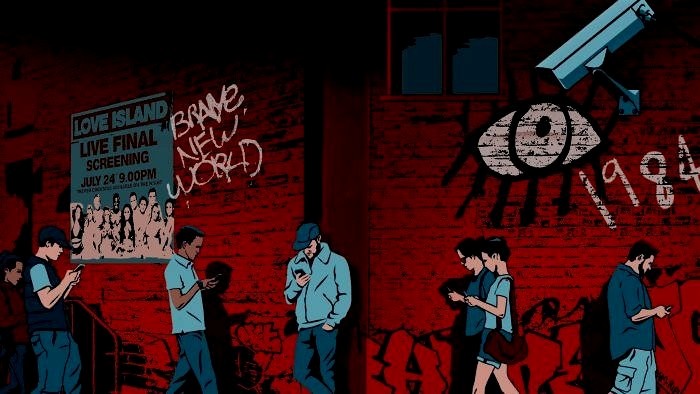By Mariam Karagianni,
Did you know that your IQ would suffer less from smoking marijuana than from multitasking with your phone? A UK study, from as far back as 2005, found that the constant influx of text messages, calls, and emails could decrease IQ by an average of 10 points — twice as much as the effect observed in cannabis users. Now, in an era dominated by short-form content —far more prevalent than it was two decades ago— the death of attention span is a well-documented fact. If I had to compare this situation to anything, it would be the Titanic. When you are constantly distracted, you don’t realize the danger you’re in until it’s too late. And then, the ship sinks into the cold abyss, and nothing can be done. Is our ship beyond saving?
Could you imagine amusing yourself to death? The ancient Greek philosopher Chrysippus is said to have died from laughter at one of his own jokes. But our amusement —and inevitable downfall— is not quite so literal. When writing 1984, George Orwell warned of a world where truth would be scarce, controlled by oppressors imposing censorship and dictating reality as they saw fit. However, that’s a stretched concept for Western, democratic societies. In truth, Aldous Huxley’s Brave New World hits much closer to home. In Orwell’s world, our oppressor is Big Brother —something external. But Huxley warns of a society so addicted to pleasure, distraction, and entertainment that censorship by a third party is unnecessary. It is internalized. We become willing participants. And when that happens, truth becomes the least of our concerns. As Neil Postman put it, it’s not just that we lack authentic information —we are losing the very sense of what it means to be well-informed. No one is forcefully silencing us; we willingly drown in a sea of triviality.

The invention of the telegraph was a milestone in fast and effective communication. But at the same time, it brought about a significant setback: people’s patience diminished, and they craved as much information as possible in the shortest time. The thing is, quality information is costly to produce, but once acquired, its distribution is cheap. So, naturally, those who profit from its dissemination emphasize the latter —producing large amounts of low-quality, sensationalist news that spread instantly. And so, to quench people’s thirst for fresh updates, a new standard emerged: information that is interesting and shocking, but not necessarily useful. As Henry David Thoreau put it, “We are in great haste to construct a magnetic telegraph from Maine to Texas; but Maine and Texas, it may be, have nothing important to communicate.” This was the beginning of what we now call the commodification of information.
Now, we don’t rely on the telegraph or our morning newspaper to deliver the news. We have 24-hour TV, Facebook, X, TikTok, and countless other platforms, all refreshing by the second. The competition to cover the latest developments has never been harsher. A never-ending flow of headlines, designed for us to scroll through mindlessly, does not allow time to process and think about what we consume. Because of this, we overlook a great deal while doom-scrolling, and truly important information gets drowned in a sea of Hollywood scandals. These bite-sized news bits give us something to discuss and feel opinionated about, but it’s alarming to realize that intelligence today is often equated with knowing a lot of things rather than understanding things deeply.
Do you know what causes most online conflict? It’s not digital pluralism. Diverse opinions are not the problem. What’s terrible is the lack of nuance in today’s fast-paced news cycle. There’s this belief that good information doesn’t need context, forcing us (the consumers) to make do with fragmented statements —statements that leave endless room for misinterpretation. Important questions are swept under the rug, leaving us to dictate answers based on pre-existing biases, without any objective guidance. And prejudices, whether they clash or align, result in messy, online mayhem.
Neil Postman argued that societies shaped by print culture, where people engaged in long-form writing and analysis, were inherently more capable of deep, rational thought. They were known for their work —their writings. A name did not evoke a physical image. Presidents of earlier times could walk down a crowded street unnoticed. Now, even when appearance has no relevance to occupation, image is what we associate with first. That’s not to say that photographs and paintings have not existed for centuries, but in today’s visually-driven society, photos and videos replace written text as the primary way we construct and comprehend reality. Seeing something with your own eyes, rather than simply reading about it, evokes emotion —it feels more real. And because it satisfies our desire for instant engagement, it gives the illusion of understanding the news, rather than actually comprehending it.

There’s nothing wrong with wanting to be entertained. But it becomes a problem when entertainment substitutes all human experience. When it becomes synonymous with value. When it becomes an expectation in every aspect of life. Learning and reading are not supposed to be entertaining. Televised court cases dealing with assault and domestic abuse accusations should not be turned into meme-fied soap operas (think Depp v. Heard). Presidential campaigns and speeches should not be evaluated based on witty one-liners but on the substance of the politics discussed (think Trump vs. Harris). Devastating news about an earthquake killing dozens should not be interrupted by an ad for a limited-edition McChicken. This is so deeply ingrained in our daily lives that we no longer realize how absurd —and even cruel— our reality has become. When people are represented by their looks and image rather than their work, it sends the message that everyone is entertainment. Politicians no longer need to do politics; they feel more like celebrities than serious leaders.
I want to avoid slipping into conspiracy territory, but I will say this: this kind of oppression is far more destructive than what 1984 warned us about. No one burned the books—we refuse to read them. Serious journalism isn’t banned— it just won’t sell as well as a headline about a botched celebrity nose job. This lethargic apathy toward knowledge is exactly the dystopia Huxley feared. And if we are to escape this cycle, we must cultivate critical thinking and choose depth over a quick dopamine hit. Otherwise, the cold waters of our own doing —our pursuit of the insignificant— will sink our ship even deeper into the abyss.
Let’s start with a simple question: how many of you managed to sit through this article without switching to another app or getting distracted?
References
- ‘Info-mania’ dents IQ more than marijuana. NewScientist. Available here
- Neil Postman. “Amusing ourselves to death: Public Discourse in the age of show business”. Viking Penguin Publishing. New York. 1985.
- Aldus Huxley. “Brave New World”. Chatto & Windus Publishing. London. 1932.




